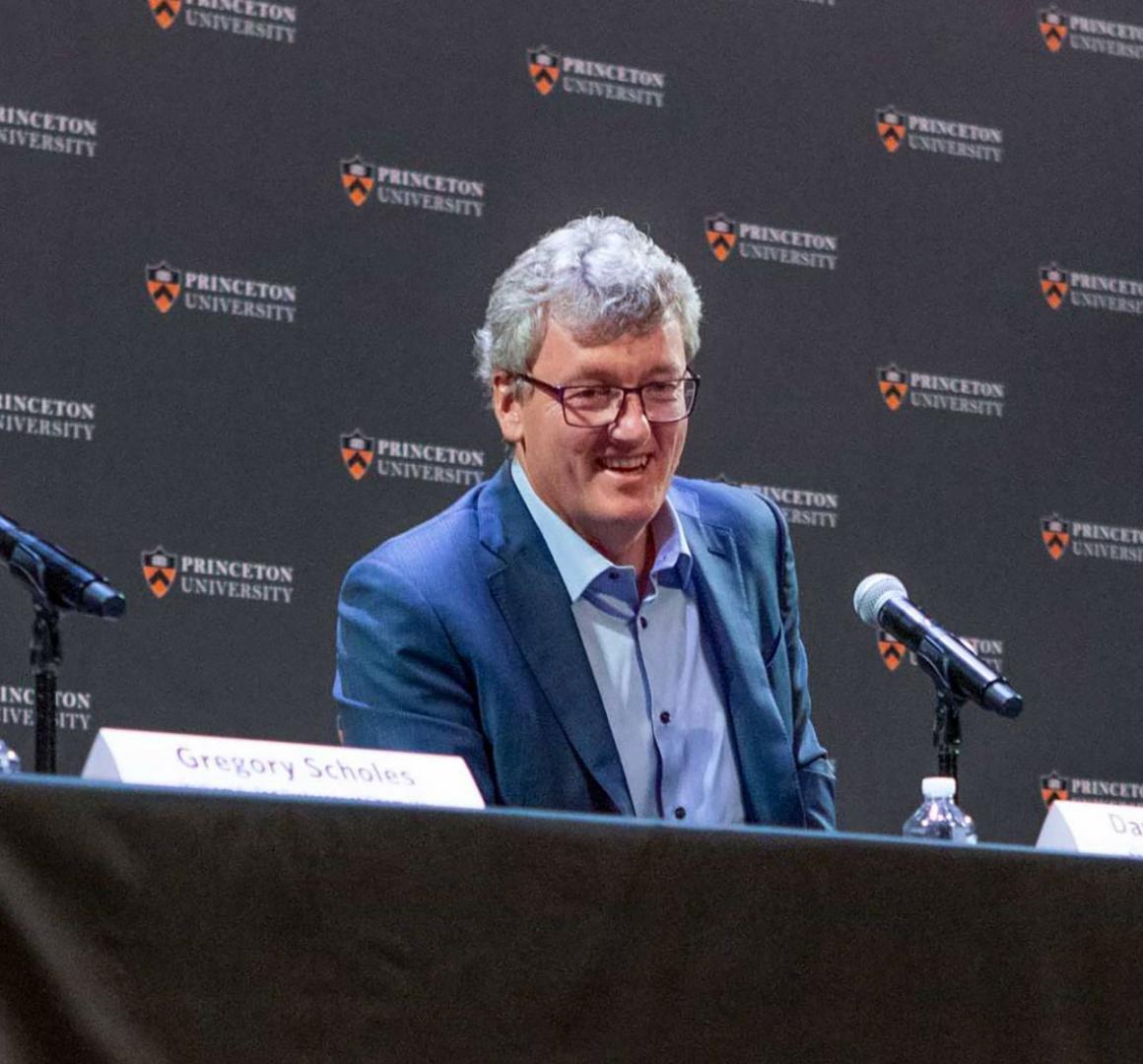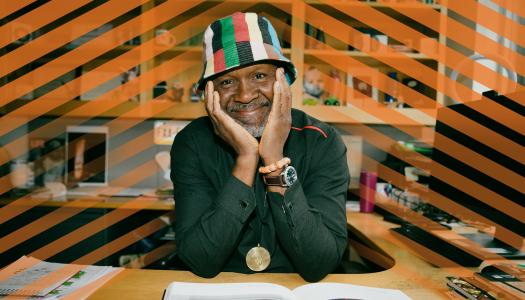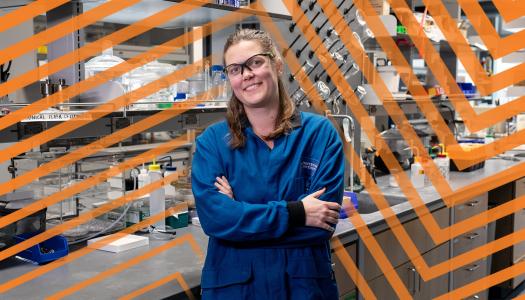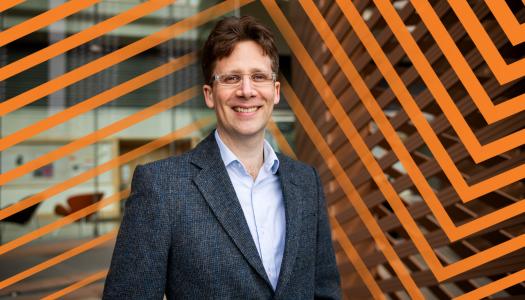‘This idea took off’: MacMillan wins Nobel Prize for opening huge new field in chemistry

When the Royal Swedish Academy of Sciences tried to inform Princeton chemist David MacMillan on Tuesday morning that he had won the 2021 Nobel Prize in chemistry, he didn’t answer the phone.
“I thought it was a prank,” said MacMillan, the James S. McDonnell Distinguished University Professor of Chemistry. “I’ve had a lot of mischievous grad students and co-workers over the years.”
The Royal Swedish Academy was more successful in reaching Ben List of the Max-Planck Institut für Kohlenforschung, Mülheim an der Ruhr, Germany, with whom MacMillan shares the prize “for the development of asymmetric organocatalysis.”
“I got a text from Ben saying, ‘I just got off the phone with the Swedish Academy, they’re trying to reach you,’ and I said, ‘Somebody is pranking us. I bet you a thousand dollars it’s not real. I’m going back to bed.’ And I did go back to sleep!” said MacMillan. “But then my phone started blowing up with calls and texts, and I realized it was really happening. So I’m a thousand dollars poorer, but happier!”
MacMillan came to campus for his regular 9 a.m. lab group meeting at Frick Chemistry Laboratory. After a standing ovation from the crowded conference room — always crowded, because he has the biggest team of students and postdocs in the department — the first student to present solemnly said, “We want to congratulate a brilliant scientist on this tremendous accomplishment.” Then he put up a slide saying, “Congratulations, Ben List!”
After laughter and more applause, the team settled into sharing research updates. Noelle Goudy, a member of the Class of 2022 who has been in his lab group since last year, said, “It’s been amazing working with Dave’s group. It’s genuinely my favorite part of being at Princeton.”
Solving problems in inventive ways is one of MacMillan’s trademarks, and it has led to him essentially invent two new fields of research.
One, organocatalysis, for which he is receiving the Nobel Prize, finds revolutionary ways to design and build small organic molecules to drive chemical reactions. These organocatalysts, which are greener than traditional metal catalysts, are used to construct new drugs and materials, and their impact is immeasurable, reaching from industrial applications to pharmaceuticals to everyday products like clothing, shampoo, carpet fibers and more.
“All scientists have so many ideas along the way,” MacMillan said. “We have way more ideas than ever succeed — but this one took off, and it took off like gangbusters.”
He is also a pioneer in photocatalysis, his research focus for the past 15 years, which uses light — ordinary, visible light — to break and rejoin atomic bonds, one electron at a time.
As he spent the morning fielding calls from reporters, loved ones and admirers, MacMillan shared insights and stories from his research and his life.
Early in the day, he said, “What we care about is trying to invent chemistry that has an impact on society and can do some good, and I am thrilled to have a part in that.”
During an interview with a Scottish news channel, he described growing up in a small town in Scotland as the son of a steelworker and a home-help worker. His brother was the first person in their family to go to college, and when he got his first job out of college, on his first day he earned more than their father did after a lifetime in the steel industry. “My father said, ‘You have to go to uni. You just have to,’ and I said, ‘All right.’” MacMillan recalled. “So I went to uni, and there, I really fell in love with chemistry — and here we are.”
After graduating from the University of Glasgow, MacMillan moved to the U.S. with a full scholarship to pursue his Ph.D. at the University of California-Irvine. He came to Princeton in 2006 and was appointed as director of the University’s Merck Center for Catalysis. He was named the James S. McDonnell Distinguished University Professor of Chemistry in 2011 and served as chair of the chemistry department from 2010 to 2015. He also leads the Princeton Catalysis Initiative (PCI), an academic incubator for interdisciplinary research on and off campus.
The self-described “proud Scotsman” retained his United Kingdom citizenship when he became an American citizen, about 10 years ago. “The possibilities for prospective research and funding were so phenomenal in America — it really made it possible to drive forward the research we want to do.”
After a morning of phone calls with reporters, punctuated by hugs and congratulatory back-slaps from colleagues and students, MacMillan was toasted by the assembled Department of Chemistry at noon, at an event attended by colleagues, students, staff and family.
“I heard the news this morning, but I still can’t believe it,” said MacMillan’s stepdaughter, Lauren Almstead, a member of the Class of 2022 who is concentrating in sociology. “I’m surprised — but I’m also not surprised, because I know how smart he is and how hard he works.”
Later in the afternoon, MacMillan was greeted by a standing ovation from the press and about 150 members of the University community at a press conference in Richardson Auditorium. “This is the first Nobel in chemistry awarded to a Princeton faculty member and a landmark moment for a superb department,” said University Provost Deborah A. Prentice in her opening remarks.
University President Christopher L. Eisgruber was attending a memorial service and could not attend. He sent this statement:
“David MacMillan is a brilliant chemist whose transformative insights and accomplishments have enhanced the power of organic chemistry to benefit human health and address other practical problems. He is also a faculty leader who during his time at Princeton has worked with colleagues to build this University’s Department of Chemistry into one of the world’s best. All of us at Princeton are thrilled to celebrate this well-deserved honor.”
MacMillan was introduced by Gregory Scholes, the William S. Tod Professor of Chemistry and chair of the department. “An exuberant and generous colleague, Dave cares deeply about the success of people around him, particularly the careers of his students and postdocs,” he said.
“Dave’s research … opened the door to achieving reactions and transformations that we previously couldn’t do,” said Scholes. “Through his work, we’re able to make chemicals, materials and medicines in ways that are cheap, green and sustainable. Perhaps the simplest takeaway is that Dave has laid the foundations for and opened up a huge new field of chemistry. And for that, we couldn’t be prouder of him and of the field of chemistry.”
In MacMillan’s brief remarks, which included thanks to the Swedish Academy of Sciences, his family and his lab group, he said, “I’m blown away by how much this University cares about excellence and about doing good for society. They really do walk that walk, which has always been impressive to me.”
He then took wide-ranging questions from members of the media, students, faculty and staff.
Sir Angus Deaton, the 2015 Nobel laureate in economics and Princeton’s Dwight D. Eisenhower Professor of International Affairs, Emeritus, asked his fellow Scotsman about the excellent public school education they had each received in their homeland, a generation apart.
“I grew up in a really working-class neighborhood and went to a working-class primary school,” said MacMillan. “I had a spectacular education from people who just were spectacularly committed. They didn’t have to be, they just were. They cared enormously. Scotland’s proud of a lot of different things, as we should be, but we’re very proud of education.”
A natural raconteur, he peppered his answers with anecdotes from the lab and jokes with his fellow chemists, and bursts of laughter filled the auditorium throughout the hour-long event. His department showed up in force, with dozens of professors and students in attendance.
MacMillan lauded their work. “My group are the people who really deserve the absolutely most credit,” he said. “Those people who have bought into what we do, what we care about, how we go forward in our science, have been remarkable now, and have been remarkable over the last 20 years. I just can’t express my gratitude enough for everything they’ve done.”
His final questioner asked him about the importance of science, especially in this era of growing skepticism towards experts and institutions.
“Without science, we don’t have anything,” MacMillan said simply. “We don’t have society, we don’t have ways of being, we don’t have ways of interacting, we have nothing. So, we need science.”
Following the press conference, the University community was invited to fête MacMillan at an outdoor reception held in a large tent behind Alexander Hall, with other Princeton Nobel laureates joining MacMillan and Deaton.
After a champagne toast by Prentice to kick off the celebration, undergraduate students, graduate students and colleagues quickly surrounded the newly minted laureate to get photos and offer congratulations.
Meryl Liu, a first-year student who also attended the press conference, said she was impressed with the way MacMillan looks at the path between his research and its impact on humanity. “He talks about the challenges of getting his ideas out to the world, but he says it’s surmountable. This is inspiring to me. I have more confidence now that young scientists like me will be able to improve world in greater ways.”
Erik Sorensen, the Arthur Allan Patchett Professor in Organic Chemistry and professor of chemistry, was on the committee that recruited MacMillan from CalTech to Princeton in 2006. “Back then, we honestly hoped his recruitment would culminate in this kind of prize. We felt this could be a real possibility. Today, we are extremely proud — and extremely grateful to the [University] administration for the investment in the department.”
Fernando Aviles and Tejas Gupta, both members of the Class of 2024, are not chemistry students but came to the press conference and reception, excited to see a Nobel laureate on their campus. “It makes you realize how special Princeton is,” Aviles said. “You can get caught up in the day-to-day, then it hits you — at any given moment, special things are going on here.”
Caren Kim and Willow Young, both first-year students, excitedly shared with each other the pictures they had gotten on their phones posing with MacMillan.
“It’s like this is just ‘casual Wednesday’ at Princeton. We won a Nobel Prize, the second one this week,” Kim said, referring to Tuesday’s Nobel awarded to Princeton senior meteorologist Syukuro Manabe for physics. “[MacMillan] gave me a great insight into life: to love learning your whole life — that the truths are all out there just waiting to be discovered.”
Young also attended the Nobel celebration for Manabe with the other eight students in her Freshman Seminar, taught by Rob Socolow, professor of mechanical and aerospace engineering, emeritus. She said both events were inspiring. “I’m glad that as undergraduates we’re allowed to the news conference and allowed to ask questions. Wow, that’s Princeton!”
Wendy Plump and Jamie Saxon contributed to this story.


